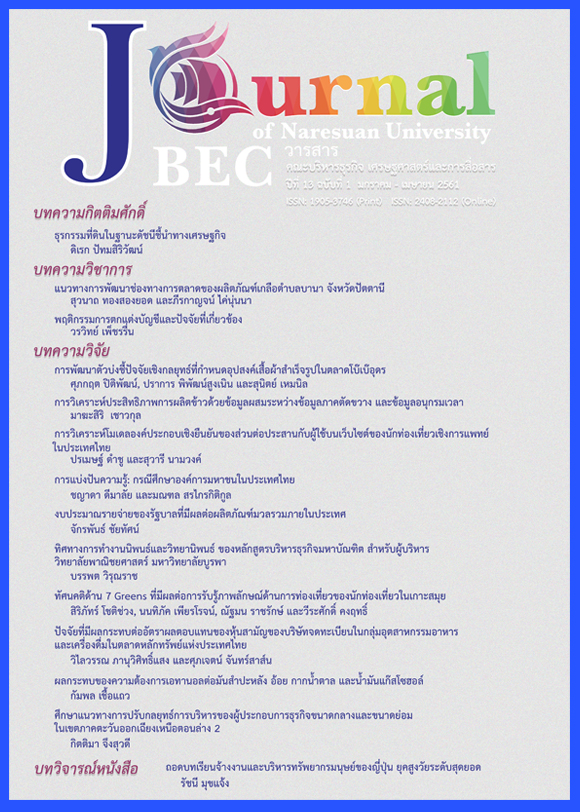การแบ่งปันความรู้: กรณีศึกษาองค์การมหาชนในประเทศไทย [Knowledge Sharing: A Case Study of Public Organizations in Thailand]
Main Article Content
บทคัดย่อ
การวิจัยนี้มีวัตถุประสงค์เพื่อศึกษา กระบวนการแบ่งปันความรู้ขององค์การมหาชนในประเทศไทย เป็นการวิจัยเชิงคุณภาพ แบบพหุกรณีศึกษาจาก 3 องค์การ มีการจัดเก็บข้อมูลจากการสัมภาษณ์เชิงลึกกับผู้บริหาร ผู้รับผิดชอบดำเนินการ และบุคลากรรวม 35 ท่าน ร่วมกับการสังเกตและการวิเคราะห์เอกสาร ข้อมูลที่ได้ถูกนำมาวิเคราะห์แนวโน้มของแต่ละองค์การ แล้วจึงนำมาเปรียบเทียบข้ามองค์การที่ศึกษา เพื่อให้ได้ข้อค้นพบจากการวิจัย ผลการวิจัยพบว่า กระบวนการของการแบ่งปันความรู้ในองค์การมหาชน ประกอบไปด้วย กำหนดเป้าหมาย กำหนดผู้รับผิดชอบ กำหนดองค์ความรู้ที่ต้องการ เครื่องมือในการจัดการความรู้ ดำเนินการแบ่งปันความรู้ ประเมินผล และจัดเก็บ ทั้งนี้ในการนำไปปฏิบัติและการปรับใช้ในแต่ละองค์การมีความแตกต่างกันตามวัตถุประสงค์ของการดำเนินงานในแต่ละองค์การ
Article Details
เอกสารอ้างอิง
นวพร ประสมทอง และคณะ. (2557). โมเดลสมการโครงสร้าง ปัจจัยที่ส่งผลต่อความสำเร็จในการจัดการความรู้ของวิสาหกิจขนาดกลางและขนาดย่อม(SMEs) กลุ่มอุตสาหกรรมอาหารและเครื่องดื่มในประเทศไทย. วารสารบริหารธุรกิจ เศรษฐศาสตร์และการสื่อสาร, 9(1), 113-126.
บุญดี บุญญากิจ และคณะ. (2547). การจัดการความรู้จากทฤษฏีสู่การปฏิบัติ. สถาบันเพิ่มผลผลิตแห่งชาติ กรุงเทพฯ: บริษัท จิรวัฒน์ เอ็กซ์เพรส จำกัด.
วิจารณ์ พานิช. (2559). ขอบฟ้าใหม่ในการจัดการความรู้. กรุงเทพฯ: มูลนิธิสถาบันส่งเสริม
การจัดการความรู้เพื่อสังคม.
สำนักงานคณะกรรมการพัฒนาการเศรษฐกิจและสังคมแห่งชาติ. (2559). แผนพัฒนาเศรษฐกิจและสังคมแห่งชาติ ฉบับที่ 12 พ.ศ. 2560-2564. สืบค้นจาก www.sukhothai.go.th/mainredcross/7I.pdf สืบค้นเมื่อวันที่ 12 ธันวาคม 2559
สำนักงานคณะกรรมการพัฒนาระบบราชการ. (2548). ความรู้เกี่ยวกับองค์การมหาชน. กรุงเทพฯ: สำนักงานคณะกรรมการพัฒนาระบบราชการ.
สุภางค์ จันทวานิช. (2554). วิธีการวิจัยเชิงคุณภาพ (พิมพ์ครั้งที่ 19). กรุงเทพฯ: จุฬาลงกรณ์มหาวิทยาลัย.
Bart van den Hooff, Jan A. de Ridder. (2004) .Knowledge sharing in context: the influence of organizational commitment, communication climate and CMC use on knowledge sharing. Journal of Knowledge Management, 8(6), 117-130.
Dalkir, K. (2005). Knowledge management in theory and practice. Amsterdam: Butterworth Heinemann.
Davenport, T. H., & Prusak, L. (1998). Working knowledge: how organizations manage what they know. Boston, Mass: Harvard Business School Press
Drucker, P. F. (1995). Post-capitalist society. Oxford [England]: Butterworth Heinemann.
Grant M.(1996). Toward A Knowledge-Based Theory of the Firm. Journal of Strategic Management , 17, 109-122.
Ikujiro Nonaka and Hirotaka Takeuchi. (1995) The knowledge-creating company: how Japanese companies create the dynamics of innovation. New York: Oxford University Press
Kaisa Henttonen, Aino Kianto, Paavo Ritala, (2016). Knowledge sharing and individual work performance: an empirical study of a public sector organization. Journal of Knowledge Management, 20(4), 749-768.
L.J. Yao, T.H.Y. Kam, S.H. Chan. (2007). Knowledge sharing in Asian public administration sector: the case of Hong Kong. Journal of Enterprise Information Management, 20(1), 51-69.
Li An Ho, Tsung Hsien Kuo. (2013). How system quality and incentive affect knowledge sharing. Journal of Industrial Management and Data Systems, 113(7), 1048-1063.
Linda Argote and Paul Ingram. (2000). Knowledge Transfer: A Basis for Competitive Advantage in Firms. Journal of Organizational Behavior and Human Decision Processes, 82(1), 150-169.
Miles, M. B., Huberman, A. M. (1994). Qualitative data analysis: an expanded sourcebook (2nd ed). Thousand Oaks Calif.: Sage
Negar Monazam Tabrizi and Sharon Morgan. (2014). Models for Describing Knowledge Sharing Practices in the Healthcare Industry: Example of Experience Knowledge Sharing. International Journal of Management and Applied Research. 1(2), 48-67.
Norman, K., Denzin, Yvonna S. Lincoln.(2000). Handbook of qualitative research (2nd ed). Thousand Oaks Calif: Sage Publications.
O’Dell, C., and Grayson, C.J. (1998). If only we knew what we know: identification and transfer of internal best practices. California Management Review, 40(3), 154–174.
Peyman Akhavan, AkBAR Rahimi, Gholamhossein Mehralian. (2013). Developing a model for knowledge sharing in research centers, VINE, 43(3), 357-393
Peter Holdt Christensen. (2007). Knowledge sharing: moving away from the obsession with best practices. Journal of Knowledge Management, 11(1), 36-47.
Riccardo Silvi Suresh Cuganesan, (2006), Investigating the management of knowledge for competitive advantageA strategic cost management perspective, Journal of Intellectual Capital, 7(3), 309-323.
Rivero, J. (1977). Droit administratif (8th ed). Paris: Dallog
Wang and Noe (2010). knowledge sharing a review and directions for future research. Human Resource Management Review, 20, 115–13.
TCIJ (2559). 14ปี องค์กรมหาชน ใช้งบ 126,929 ล้าน จับตาปี 59 เริ่ม‘ยุบ-ย้ายการกำกับดูแล.สืบค้นจาก. http://www.tcijthai.com/news/2016/01/scoop/5990.สืบค้นเมื่อวันที่ 30 ธันวาคม 2559
Yin, R, K. (2014). Case study research: design and methods (5th ed). Thousand Oaks, Calif.: Sage Publications.


